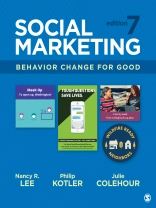Successful social marketing holds the power to change the world. Social Marketing: Behavior Change for Good, 7th Edition is the definitive guide for designing and implementing memorable social marketing campaigns. Authors Nancy R. Lee, Philip Kotler, and Julie Colehour present a proven 10-step strategic marketing plan and guides students through each stage of the process. The 7th Edition is packed with 12 new cases and dozens of new examples related to today′s most pressing social problems including the COVID-19 pandemic, natural disasters, equity and inclusion, and homelessness. The new edition also includes significantly expanded coverage of social media. Whether your students are on a mission to improve public health, protect the environment, or galvanize their community, they will find Social Marketing an invaluable resource.
Daftar Isi
Foreword
Part I • Understanding Social Marketing
CHAPTER 1 • Defining and Distinguishing Social Marketing
What Is Social Marketing?
Where and When Did Social Marketing Originate?
How Does It Differ From Commercial Marketing?
How Does Social Marketing Differ From Other Disciplines?
Who Does Social Marketing?
What Social Issues Can Benefit?
Other Ways to Impact Social Issues
Social Marketing Upstream and Midstream
CHAPTER 2 • 10-Step Strategic Planning Model
A 10-Step Planning Model
Why Is Systematic Planning Important?
Where Does Research Fit In?
CHAPTER 3 • Research Options
Major Marketing Research Terminology
Steps in Developing a Research Plan
Research That Won’t “Break the Bank”
CHAPTER 4 • Behavior Change Theories, Models, and Frameworks
Informing Selection of Priority Audiences
Informing Behavior Objectives and Goals
Deepening Understanding of Audience Barriers, Benefits, Motivators, the Competition, and Influential Others
Inspiring Development of Marketing Intervention Mix Strategies
Part II • Determining Plan Purpose, Focus, Audience, Behaviors, Insights
CHAPTER 5 • Steps 1 & 2: Social Issue, DEI Considerations, Purpose, Focus, Situation Analysis
Step 1: Describe Social Issue, DEI Considerations, Background, Purpose, and Focus
Step 2: Conduct Situation Analysis and Review Prior Efforts
The Role of Exploratory Research When Choosing Focus
Ethical Considerations When Choosing Focus
CHAPTER 6 • Step 3: Selecting Priority Audiences
Step 3: Select Priority Audiences
Steps in Selecting Priority Audiences
Variables Used to Segment Markets
Criteria for Evaluating Segments
How Priority Audiences Are Selected
Ethical Considerations When Selecting Priority Audiences
CHAPTER 7 • Step 4: Behavior Objectives and Target Goals
Step 4: Set Behavior Objectives and Goals
Behavior Objectives
Knowledge and Belief Objectives
Target Goals
Ethical Considerations Setting Objectives and Goals
CHAPTER 8 • Step 5: Audience Insights
Step 5: Identify Audience Insights
What You Need to Know About Your Priority Audience
How to Learn More About Priority Audience
How Insights Help Develop Strategy
Potential Revisions
Ethical Considerations When Researching Priority Audience
Part III • Developing Marketing Intervention Strategies
CHAPTER 9 • Step 6: Crafting a Desired Positioning
Positioning Defined
Step 6: Develop Positioning Statement
How Positioning Relates to Branding
Ethical Considerations for Developing a Positioning Statement
CHAPTER 10 • Step 7.1: Product: Creating a Product Platform
Product: The First “P”
Step 7.1: Develop the Social Marketing Product Platform
Decisions Regarding Tangible Goods
Decisions Regarding Services
Branding
CHAPTER 11 • Step 7.2: Price: Determining Incentives and Disincentives
Price: The Second “P”
Step 7.2: Determine Incentives and Disincentives: Six Options to Consider
More on Commitments and Pledges
Setting Prices for Tangible Goods and Services
CHAPTER 12 • Step 7.3: Place: Making Access Convenient and Pleasant
Place: The Third “P’
Step 7.3: Develop Place Strategy
Ethical Considerations When Selecting Distribution Channels
CHAPTER 13 • Step 7.4: Promotion: Deciding on Messages, Messengers, Creative Strategies, and Communication Channels
Promotion: The Fourth “P”
Message Strategy
Messenger Strategy
Creative Strategy
Pretesting
Selecting Communication Channels
Factors Guiding Communication Channel Decisions
Ethical Considerations Related to Promotion Strategies
Part IV • Managing Social Marketing Programs
CHAPTER 14 • Step 8: Monitoring and Evaluation
Step 8: Develop a Plan for Evaluation
Why Are You Conducting This Measurement?
What Will You Measure?
How Will You Measure?
When Will You Measure?
How Much Will It Cost?
Ethical Considerations in Evaluation Planning
CHAPTER 15 • Step 9: Budget and Funding Plans
Step 9: Budgets and Funding Sources
Determining Budgets
Finding Sources for Additional Funding
Appealing to Funders
Revising Your Plan
Ethical Considerations When Establishing Funding
CHAPTER 16 • Step 10: Implementation and Sustaining Behaviors Plans
Step 10: Complete an Implementation Plan
Phasing
Sustainability
Sharing and Selling Your Plan
Ethical Considerations When Implementing Plans
Epilogue
Appendix
References
Index
Tentang Penulis
Philip Kotler, is the S. C. Johnson & Son Distinguished Professor of International Marketing emeritus at the Kellogg School of Management, Northwestern University, Evanston, Illinois. Kellogg was twice voted Best Business School in Business Week’s survey of U.S. business schools. It is also rated Best Business School for the Teaching of Marketing. Professor Kotler has significantly contributed to Kellogg’s success through his many years of research and teaching there. He received his master’s degree at the University of Chicago and his Ph.D. degree at MIT, both in economics. He did postdoctoral work in mathematics at Harvard University and in behavioral science at the University of Chicago. Professor Kotler is the author or co-author of 90 books including Marketing Management, the most widely used marketing book in graduate business schools worldwide; Principles of Marketing; Marketing Models; Strategic Marketing for Non-Profit Organizations; The New Competition; High Visibility; Social Marketing; Marketing Places; Marketing for Congregations; Marketing for Hospitality and Tourism; The Marketing of Nations; Marketing 3.0; Good Works; Market Your Way to Growth; Winning Global Markets; Kotler on Marketing; Confronting Capitalism; Democracy in Decline: and Advancing the Common Good. He has published over 170 articles in leading journals, several of which have received best-article awards. Professor Kotler was the first recipient of the Distinguished Marketing Educator Award (1985) given by the American Marketing Association (AMA). The European Association of Marketing Consultants and Sales Trainers awarded him their prize for Marketing Excellence. He was chosen as the Leader in Marketing Thought by the Academic Members of the AMA in a 1975 survey. He also received the 1978 Paul Converse Award of the AMA, honoring his original contribution to marketing. In 1995, Sales and Marketing Executives International (SMEI) named him Marketer of the Year. In 2012 he received the William L. Wilkie “Marketing for a Better World: Award of the American Marketing Association Foundation (AMAF).” In 2014, he was inducted into the AMA Marketing Hall of Fame. He was the first chosen Legend in Marketing and his work was published and reviewed in nine volumes. Professor Kotler has consulted for such companies as IBM, General Electric, AT&T, Honeywell, Bank of America, Merck, and others in the areas of marketing strategy and planning, marketing organization, and international marketing. He has been chairman of the College of Marketing of the Institute of Management Sciences, director of the American Marketing Association, trustee of the Marketing Science Institute, director of the MAC Group, former member of the Yankelovich Advisory Board, and a member of the Copernicus Advisory Board. He was a member of the Board of Governors of the School of the Art Institute of Chicago and a member of the advisory board of the Drucker Foundation. He has received 22 honorary doctoral degrees from Stockholm University, University of Zurich, Athens University of Economics and Business, De Paul Unive












